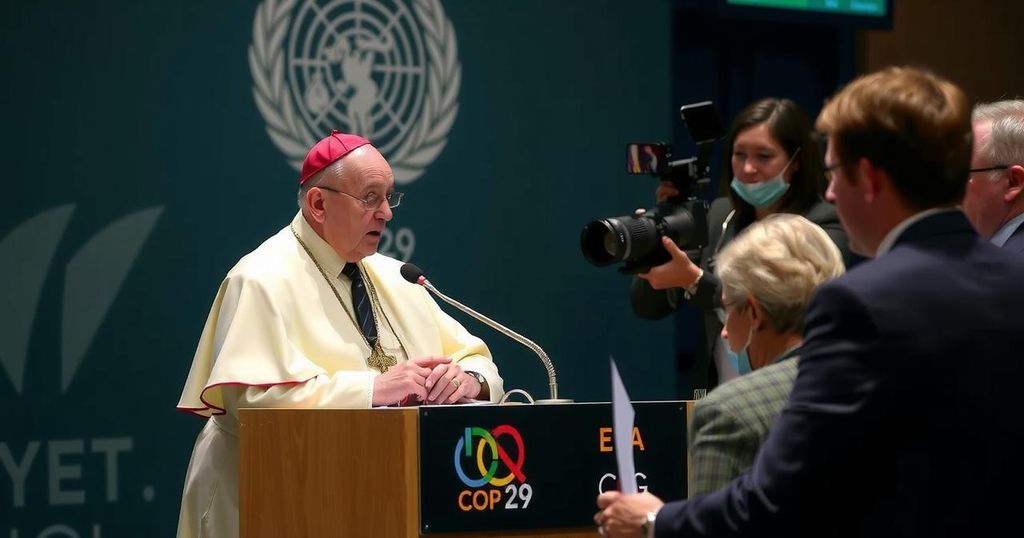A conflict has erupted at COP29, where the Vatican and other conservative nations are blocking discussions on women’s rights in climate negotiations, citing concerns over gender terminology. This opposition raises fears that vital support for women, who are disproportionately affected by climate change, will be hampered amid critical negotiations. Advocates emphasize the urgent need for inclusive policies, particularly as the existing UN gender framework approaches expiration.
During the COP29 climate summit taking place in Azerbaijan, a significant dispute has arisen surrounding women’s rights, primarily instigated by the Vatican and a coalition of conservative countries. The Vatican’s representatives have joined forces with nations such as Saudi Arabia, Russia, Iran, and Egypt to halt progress on a deal aimed at enhancing support for women adversely affected by climate change. According to Colombia’s environment minister, Susana Muhamad, the intervention is perceived as an unacceptable obstruction, particularly as women currently represent the majority of individuals displaced due to climate impacts. This year’s summit was expected to revisit the Lima Work Programme on Gender, which has advocated for women’s experiences and increased resource allocation. However, opposition to the terminology relating to “gender” has emerged, with specific concerns regarding its implications for transgender identities and the acknowledgment of LGBTQ+ rights. Charities monitoring the negotiations express concern over the potential repercussions of this deadlock on women’s rights initiatives, particularly given that only a fraction of global funding currently addresses women’s roles in climate resilience. As the conference nears its conclusion, the urgency to finalize a comprehensive plan to support women facing climate-related challenges intensifies. Amid a climate crisis, the intersection of gender and climate change has become increasingly pertinent. Women disproportionately experience the negative impacts of climate phenomena, often exacerbated by social and economic factors. Organizations, including ActionAid, emphasize the need for targeted funding strategies that account for gender dynamics. Statistics predict that by 2050, food insecurity caused by climate change will significantly affect millions more women and girls compared to men. Activists contend that clarifying respective experiences based on gender identity is necessary to develop equitable solutions. Despite longstanding recognition of these disparities, recent negotiations have exposed a resurgence of resistance to inclusive representation. The current discourse underlines the urgent necessity for collaborative dialogues centered on equitable principles. Women’s rights advocates underscore the importance of diverse representation in shaping effective policy solutions, cautioning against potential regressions in the fight for gender parity in climate initiatives. As the COP29 summit draws closer to its conclusion without an agreed-upon plan, concerns mount regarding the implications for women’s roles and recognition within the global climate response framework. The Vatican’s stance, combined with that of its allies, illustrates a broader international trend against acknowledging diverse identities within climate discussions, which could hinder vital support for vulnerable populations. The outcome of these negotiations could have lasting effects on the advancement of women’s rights globally within the context of climate action. As Pope Francis has previously expressed openness to certain LGBTQ+ rights within a limited context, the Vatican’s recent actions deviate from a more progressive approach observed in other discussions. If the impasse remains unresolved, the imminent expiration of existing gender-related climate frameworks lacks clarity regarding the future support for women’s issues amid increasingly devastating climate impacts. In summary, the COP29 climate negotiations have highlighted a critical contention between gender rights and climate action, with the Vatican’s coalition presenting substantial challenges to advancing women’s interests in future agreements. Advocates for women’s rights call for inclusive dialogue to effectively address disparities exacerbated by climate change, as the potential for a gender-equitable global action plan hangs in the balance during the final days of negotiations.
The conflict at the COP29 climate summit centers on the intersection of gender rights and climate action, as the Vatican’s opposition to discussions regarding women’s support reflects a larger trend among conservative countries. Women disproportionately suffer the consequences of climate change, often due to socio-economic challenges and their roles as caregivers. The Lima Work Programme on Gender, established over a decade, aims to ensure women’s experiences and needs are prioritized in climate response strategies. Current negotiations are jeopardized by disputes over the definitions and implications of gender terminology, specifically regarding transgender identities and LGBTQ+ recognition in climate policies.
In conclusion, the current impasse at the COP29 summit highlights the tension between advancing gender rights and addressing climate challenges. The Vatican, along with its allies, has raised significant concerns that could stall critical support for women disproportionately affected by climate change. As the negotiations progress, it is imperative that stakeholders prioritize inclusivity and equity within climate action frameworks to ensure that the voices of all individuals, particularly women, are adequately represented and supported in addressing vulnerabilities associated with climate crises.
Original Source: www.bbc.com






